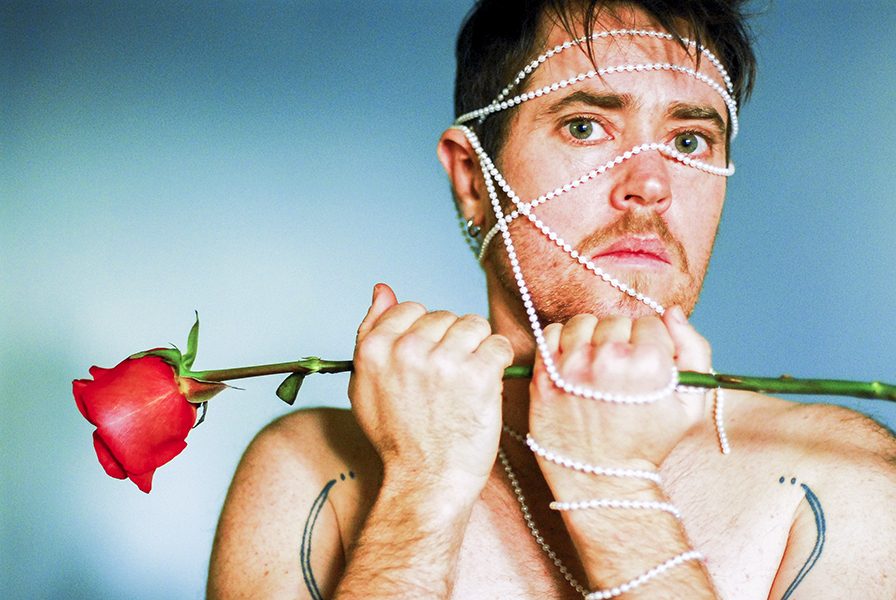LOTL chats to the Brisbane artist about technology, relationships and LGBTIQ issues.
Brisbane’s queer and transgender artist, Sunny Drake, has toured the world with his international hit one-man show, “Transgender Seeking…”. The responses from cities around the world have been immense, and luckily for us, he’s bringing the work home for a 10 city national tour, including Brisbane Powerhouse’s MELT Festival.
“Transgender Seeking…” is an exposing, funny and tender look at queer and trans relationships including run-ins with the anti-monogamy police, online dating mishaps and figuring out whether to throw out or reinvent mainstream relationship ideals. The show is a smart, fast-paced take on dating in an age of social media and technology.
Your show, ‘Transgender Seeking…’, sold out in Europe, the USA and Canada (Congratulations)! What would you like Australian audiences to take away from it?
I’m so excited to bring the work back home to Australia! I hope that the show can be one of many threads of conversation in LGBTIQ communities (and beyond) about how we relate to each other, how we are responsible when we mess up and how we can love each other well. I hope that audiences will reflect on their own relationships whilst having a fun night out! It’s a big priority to me to make work that not only speaks to important issues in our lives, but that is also creatively strong and entertaining.
In a world abundant with social media and technology, how do you think this influences dating and our relationships?
Social media & technology has increased many people’s access to community, like so many young (and not so young) LGBTIQ people living in regional areas. I’ve been touring a lot to smaller cities and towns and people seem to be more connected digitally to friends, community and potential dates than in previous generations. I get hundreds of emails and Facebook messages in response to my blog and shows. On the flipside, cyber-bullying can be really intense! The fact that people can’t physically experience the impacts they’re having on others contributes to a culture of people lashing out at each other on social media. It’s also easy to forget that digital intimacy is very different than face to face intimacy. I still meet a lot of people who feel very isolated despite being digitally connected.
What is your opinion on mainstream relationship models such as marriage?
I think the legal institution of marriage is very narrow – it gives benefits only to a particular style of relationship and therefore disadvantages the many other types of relationships like people with multiple partners or lovers, housemates, non-sexual best friends and single parents to name a few. Beyond these legal inequalities, I don’t think there’s anything wrong with the actual model of committing monogamously to one person – I’d just like to see more support for a whole array of options. Having said that, sometimes in queer communities we can end up going too far in the other direction and unfairly shaming people who want to be monogamous or get married.
I also think that many campaigns have over-focused on the gay marriage agenda. Even though I support gay marriage, there are many other pressing and important issues that don’t get the same resources and focus, like addressing housing, poverty, unemployment & violence against trans women and sistergirls.
From travelling all over the world, what have you learnt about the issues that face LGBTIQ individuals?
There are certainly many different and many similar strengths and challenges of LGBTIQ communities in various places I’ve toured to. Something I notice the world over is how awesomely resilient LGBTIQ communities are! It really is incredible to see the array of spaces, events, programs and support that communities have created for themselves. Something I think many people overlook is that in countries with more legal rights, these rights don’t always positively benefit some of the more marginalised communities within the LGBTIQ umbrella. It can be difficult to campaign once certain legal rights are won, because they come up against sentiments like “but you’ve got gay marriage, you’re equal now, what more do you want?”. This is one of the reasons I’m in favour of taking more time to make sure that we’re focusing our resources and energy in support of the leadership of and issues of more marginalised communities, such as trans women of colour and Aboriginal LGBIQ people sistergirls and brotherboys.
Do you have any advice for LGBTIQ individiuals within the performing arts industry?
Don’t be afraid to make work specifically for an LGBTIQ audience, if that’s where your heart is. Personally I don’t buy into some people’s concerns of “preaching to choir”. LGBTIQ communities deserve nuanced and dynamic work that reflects our diverse lives. We all have a life full of work to keep doing within our communities and art can be a powerful way to have conversations and build our resilience. On the flipside, don’t feel trapped into making work with LGBTIQ themes – we are whole people with many interests and aspects to ourselves. The great surprise has been that broader audiences are engaging with and enjoying my work too – even when my shows have unwatered down queer and trans content and aeshetics. One of the challenges is that many presenters seem to be more conservative than their audiences and can have a tendency to pigeon-hole my work as only for LGBTIQ audiences. This can make it challenging to book shows in places where there are smaller LGBTIQ communities or in spaces with the sort of resources I need to sustain my work. We need to be working together as LGBTIQ artists to challenge presenters and advocate for each other’s work.
